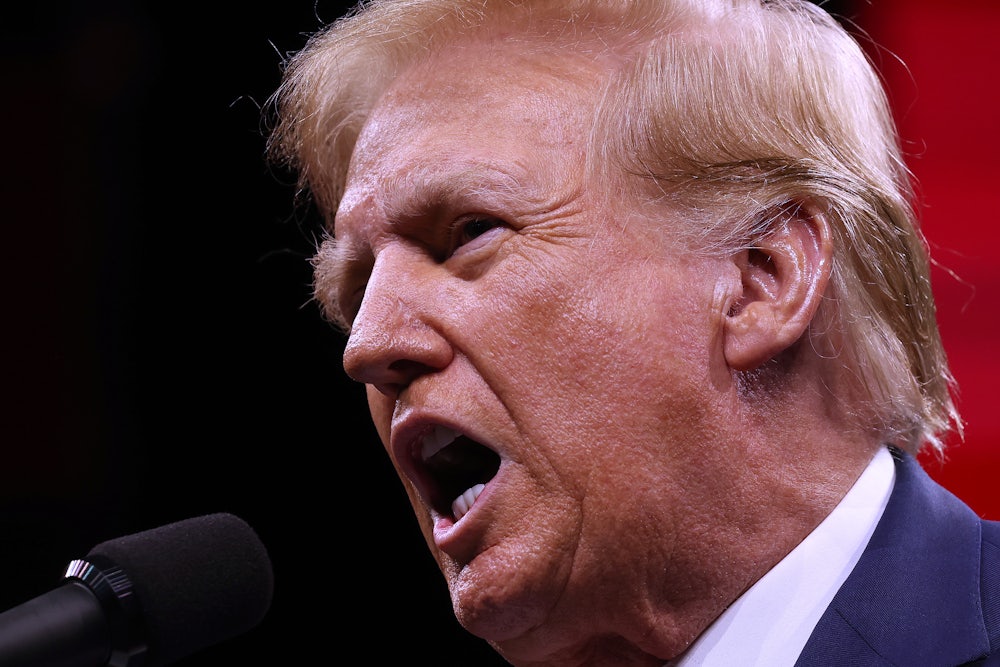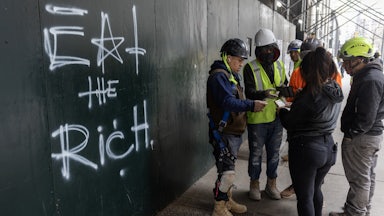“It’s a country of laws, and the laws are greater than any one person’s ambitions or desires,” began editor Michael Tomasky in his opening remarks at TNR’s Stop Trump Summit in Philadelphia, held Saturday afternoon at the Independence Visitors’ Center, a stone’s throw from the building where the Constitution was written. “That proposition is being challenged today in a way that it has not yet been in these United States, and that’s why we’re here today.”
Donald Trump’s presidential run served as the organizing theme for the panels that followed, and, to be sure, discussion largely centered on the former president: his legal troubles and the status of the New York hush-money case, his prospects as a candidate, the damage done by his presidency—and the damage that awaits if he wins in November.
Daily Beast columnist Rotimi Adeoye recounted the story of a volunteer election worker forced to live out of her car, hounded out of her neighborhood by threats, after Trump’s team spread baseless claims about election fraud. Lizbeth Rodriguez, community engagement coordinator at the Philadelphia Women’s Center, described a national landscape in which abortion providers have been forced to serve as “travel agents” for women seeking reproductive care in red states, in the aftermath of the Dobbs decision, made possible by three Supreme Court justices appointed by Trump. The aftershocks of Trump’s presidency are still being felt, but the looming threat of a second term brings with it a fresh slate of threats.
Most ominous among them is Trump’s promise to dismantle the civil service and reconstitute it as a bureaucracy of loyalists, laid out in the 900-page Project 2025. Panelist Joe Spielberger is the policy counsel for the Effective and Accountable Government Team of POGO Action, an arm of the Project on Government Oversight—along with the American Federation of Teachers, one of the event’s co-sponsors. Spielberger described the implications of Trump’s threat, grimly previewed by the little-known executive order Schedule F, signed late in Trump’s term.
“This would allow a president to purge the civil service of nonpartisan experts, people who served with integrity, and pack every federal agency with partisan loyalists who’d be willing to follow any order without question, regardless of how unlawful it would be,” Spielberger said. Once it was complete, there would be “nobody left who is able and willing to speak out and prevent a true authoritarian takeover of our federal government.”
What emerged from the panels was less an analysis of Trump as a sui generis figure in American politics than a kaleidoscopic depiction of the threat to American democracy by the movement he helms. As journalist Anne-christine d’Adesky, a late addition to the event, explained, the assault on reproductive rights and secular democracy are agenda items of the Christian nationalists to which Trump has yoked himself.
Stopping Trump, then, panelists agreed, requires a broad coalition of small-d democrats devoted to the rule of law. Speaking with TNR’s Greg Sargent in a pretaped video segment, George Conway revealed that he believes former GOP Representative Liz Cheney is likely to make a “full-throated endorsement” of President Biden at some point before the election.
Fissures in the anti-Trump coalition were nonetheless apparent. When Conway explained how Trump had “co-opted” the conservatism of the Federalist Society’s founding members, Sargent pressed him, asking about “the role of more endemic qualities in the movement leading to this moment.” Vanity Fair writer Molly Jong-Fast later echoed the point, saying of conservative Never-Trumpers: “We all knew where this was going; it’s just, they didn’t want fascism like that. And you know, I respect them for joining us now, but there’s a high level of culpability for these guys.”
The overwhelming sense was that the enormity of the task at hand requires a big tent. It includes federal workers, who, Spielberger explained, “play such an essential role as a guardrail against authoritarianism,” and organizers like Kadida Kenner, a leading get-out-the-vote organizer in Pennsylvania who stressed the importance of voter registration on a panel about the Keystone State’s importance in 2024.
Victory also requires focus on state legislatures, which Pennsylvania state Senator Vincent Hughes reminded have been the “backstop” in reproductive care and voting rights. And it requires winning voters. “It is not the job of the legal system to keep Donald Trump from being president. That’s our job; that’s the job of the voters. And we can’t lose sight of that. There was never, ever going to be a silver bullet,” Conway said.
Where does that leave the Biden campaign, then? Jong-Fast’s prescriptions were straightforward: Codify Roe, vow to impose term limits on Supreme Court justices, stop gerrymandering, and reauthorize the Voting Rights Act. She pointed out that Bernie Sanders is “still 100 percent on the Biden train. And the reason why is because he has done the kind of progressive legislation that Americans have really longed for.”
Indeed, Biden’s National Labor Relations Board and Federal Trade Commission appointees and the Inflation Reduction Act have ushered in a new era of worker and consumer power. “No one thought that UAW would win an election in the South to organize a plant—they just did,” Democratic political strategist J.J. Abbott said. Hughes advised the campaign to tout Biden’s accomplishments. It’s “a hell of a record,” he said. “Make this election about the people who will be impacted,” Abbott added. (Amending the administration’s policy in Gaza, it should be mentioned, did not come up.)
And yet, will trumpeting the administration’s accomplishments be enough to inoculate undecided voters against Trump’s libidinal appeal? Rick Wilson, speaking in a prerecorded segment with TNR staff writer Walter Shapiro, wasn’t sure. “Democrats believe elections are about policy and not about emotions.… It’s gotta be more emotional and evocative and engaging.” But sounding the alarm about another Trump term isn’t enough. “Doom is not an inspiring strategy for getting people to go and vote,” said Abbott.
What is to be done, then, before November? Adeoye emphasized the importance of confirming liberal federal judges and, like Jong-Fast, suggested reauthorizing the Voting Rights Act. Kenner stressed that young voters, with whom Biden is suffering, must be engaged. University of Pennsylvania law professor Claire Finkelstein had darker recommendations. “We need to put a lot of energy into the possibility that Trump will be elected,” she said. A potential Trump victory would mean special counsel Jack Smith will be fired, a possibility Finkelstein said Democrats must prepare for by reexamining special counsel laws to “imbue [special counsels and the Justice Department] with more independence.”
Talking with Conway, Sargent recalled Barack Obama’s comment following the 2012 election that the “fever will break” in the Republican Party. It did not, and it will not. A revanchist, antidemocratic Republican Party is not going to course-correct. “Do I think the rule of law is holding?” Jong-Fast asked. “No, I don’t.”






